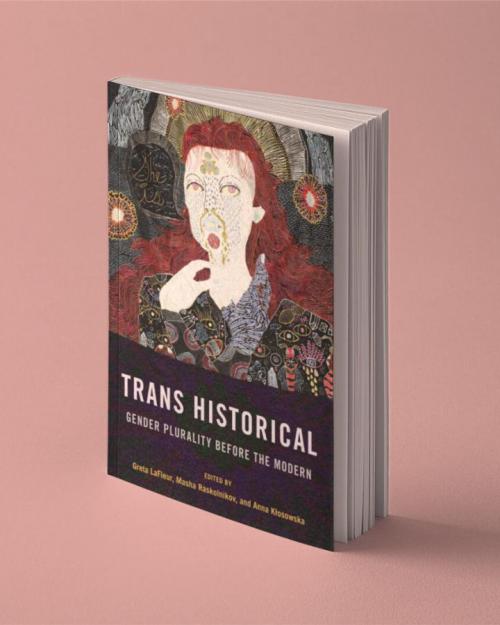A new book, “Trans Historical: Gender Plurality before the Modern” (Cornell University Press), co-edited by a Cornell professor, explores what gender might have been before modern medicine, the anatomical sciences, and the modern division of gender difference into a binary form.
“The book is a collection of essays about trans, nonbinary and gender-complicated people across a broad geographic range, from Poland to France to early Colonial America, going all the way back to Byzantine and Ancient Roman writings,” said Masha Raskolnikov, associate professor of literatures in English in the College of Arts & Sciences. She co-edited the volume with Anna Klosowska, Miami University, and Greta LaFleur, Yale University.
The editors describe one of their goals as seeking to refute arguments that transgender people, experiences, and identities were non-existent or even impossible prior to the twentieth century. “We hypothesize that one of the less insidious reasons trans experience may be assumed to be a ‘modern phenomenon’ ... is actually precisely the lack of a consolidated, widespread understanding of any gender at all [prior to modernity],” the editors wrote in their introduction. “Without a polarized and siloed understanding of man and woman, it is difficult to assert some sort of categorical difference, because of the lack of a categorical understanding of terms like male and female to begin with.”
Using extensive archival resources—literary texts, trial transcripts, documents, and artifacts -- the volume's multidisciplinary group of contributors consider how individuals, communities, and states understood and enacted gender as a social experience distinct from the assignment of sex at birth.
“Gender nonconforming and transgender people appear consistently in fiction, religious texts, church and court records, and even in texts authored by trans people themselves from antiquity onward,” the editors write. “Furthermore, narratives about gender transition and gender confirmation were told long before any of those terms came into being.”
The volume resulted from the “Transforming Bodies” conference organized in 2017 by Kathleen Perry Long, professor of Romance studies (A&S). This interdisciplinary conference brought together 54 scholars in early modern studies working on gender, race, environmental studies, animal studies, history of medicine, art history, literary studies, philosophy, and performance studies, among other fields.
Long’s contribution to the book, “The Case of Marin le Marcis,” looks at a 17th century legal case in France centered on the difficulty of identifying Marin le Marcis as male or female, since he seemed to present characteristics stereotypically associated with both. As someone who was baptized as a female but who lived as a man, Marcis was convicted of sodomy and sentenced to die. He appealed the decision and eventually won the right to live his life as he chose. “Long’s essay reveals that early modern medical and legal texts acknowledged variations in what, today, we might term ‘biological sex’ as well as lived gender,” write the editors.
Raskolnikov’s essay, “Without Magic or Miracle,” examines a 13th century French text, “Le Roman de Silence,” in which Silence, the assigned female at birth protagonist, is raised as a male in order to legally inherit. Although Silence didn’t choose the role, they succeed in it, and Raskolnikov asks the question whether Silence could or should be considered a “trans ancestor.”
Raskolnikov said she is proud of how the book turned out. “A major goal and achievement of the volume is the number of contributors who identify as trans and genderqueer. We also published a number of pieces by young, up-and-coming scholars of trans studies who do not yet have permanent positions at any university,” she said. “It shows how work in the humanities can make a political as well as a social intervention. I do hope that our volume is the first of many similar volumes, and that there will be more and more leadership in organizing such volumes by tenured and employed out trans scholars.”
She added that “we fund-raised a lot in order to lower the price of the paperback edition, and hope that it’s affordable enough to get into the hands of young trans people for whom it might feel affirming to know that non-normatively gendered people have been recognized and loved even in the distant past.”




